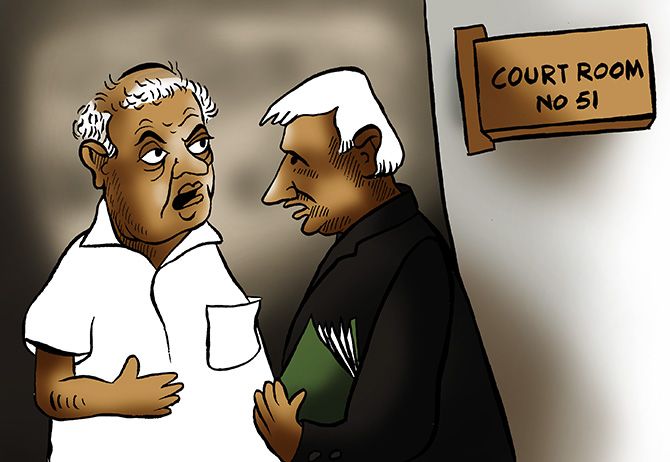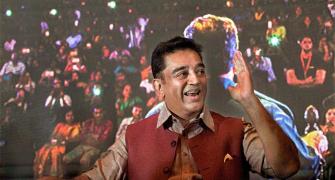'If I have to write a letter I will give it to the media. They will put it out.'
Vaihayasi Pande Daniel reports from the Sheena Bora murder trial.
Illustration: Uttam Ghosh/Rediff.com

It was an unexciting Friday in court in the Sheena Bora murder trial.
But not an unimportant Friday in this trial, in spite of all outward appearances.
There was no incisive cross questioning of former driver Shyamvar Pinturam Rai.
No turbulent bouts between Sudeep Pasbola, counsel for Accused No 1 Indrani Mukerjea and Bharat Badami, the CBI special prosecutor.
Nor little moments of humour and sunshine between CBI Special Judge Jayendra Chandrasen Jagdale and the court.
Missing too were nearly 50 of Rai's quota of 60 yaad nahins.
Time dragged. Those tiny moments of adrenaline rush, that surface occasionally when a lawyer does a magical verbal maneuver before the judge, did not even step into Courtroom 51 at the city civil and sessions court, Kala Ghoda, south Mumbai, November 10.
Everyone squirmed listlessly in the lumpy court chairs, from which, on some, still hung tattered, dusty plastic wrapping, or the backless benches, waiting for a climax that never arrived.
The only interesting scenery was the yet-another new look Indrani debuted, drawing attention to herself.
Friday's specialty was that of an Assamese beauty. Wearing a yellow and red sleeveless kurta-salwar, bindi, her trimmed hair was put up in a bun, her face was made up and kajal winged outwards and upwards from her eyes.
She looked doll-like as she sat beside former Husband No 2 Sanjeev Khanna in the accused dock, with Peter Mukerjea furthest away.
That seating arrangement might have been by design, given that Indrani recently released to the media an angry letter addressed to Peter, complaining about him.
Peter had his sister Shangon Das Gupta in from Bengaluru to see him. And Sanjeev's brother, also from Bengaluru, and cousin were there.
The seating arrangement in court had been switched about some, with a line of six more new trunks, the shiniest and most populous things in this drab room, replacing a row of seating between the accused enclosure and the rest of the room.
That didn't prevent Peter's sister, who is younger than him, from making trips to the back of the room to boost his morale, gently holding his hand occasionally.
Decidedly Friday was a downer after last week's eventful hearings through the course of which it was revealed that Rai, the Mukerjeas' erstwhile driver, was a man of many, many parts.
When his hands had not been on the steering wheel, his fingers were peripatetic, dialing the numbers of brokers, real estate agents, moneylenders, lawyers, builders as well as friends, family and former employees of the Mukerjeas for reasons not yet uncovered in front of the court.
His contact list was long and diverse, his calls often lengthy, and intriguingly one of his chief contacts was Sameer Buddha, an assocate of the Mukerjeas, who runs a security agency, with whom Rai exchanged 21 calls in the six or seven days running up to Sheena's murder.
Even if Friday was not a day of the customary getting-the-hands-dirty cross examination of Rai by Pasbola, it was nonetheless a crucial date -- the start of the scrutiny of the omissions.
The still missing Airtel cell data for Rai's phone and others -- with Airtel insisting it needed another week -- necessitated that Pasbola change the day's agenda, rather than opt for a postponement of the hearing.
Therefore began the tedious but critical process of comparing Rai's testimony to the court with what he said at the Khar police station, north west Mumbai, after his 2015 arrest -- his 161 (under the Indian Penal Code, the statement to police) that was noted down in Marathi and signed by him.
The reliability and honesty of a witness is tested by the number of contradictions and omissions between what s/he said in a 161, before an investigating officer, and what s/he said before a court.
If the witness overturns her/his earlier statement, amends it, or leaves out passages, that amounts to an omission of material.
Evidently the man arrested while walking along the sea face in Khar on an August night in 2015 for illegal possession of a weapon -- a katta or country revolver -- and brought to that police station, had then a much less terrific memory. He was also a person of fewer words.
There were pages and pages of additional facts, absurdly, that Rai provided to the court that were not there in his initial, sparse-and-dry-as-the-Sahara recitation of events to the Khar police officers two years before.
Like: "Shyam, jab aap akele room mein Indrani Madam se Skype par baat kar rahein the, Indrani Madam said that you were a confidential (sic) man, bharosa wallah aadmee and don't tell anyone about this matter. Is me aisa likha nahin hai. Karan bata sakte hai? (When you were in the room at the office alone talking to Indrani Madam on Skype, Indrani Madam said you were a trustworthy man and not to tell anyone about the matter (the murder). It is not written in your statement. What is the reason?)"
Or that Indrani had told him: "Ki Sheena aur Mekail humari badnami kar rahein hai, mom bulakar. Jhagda chal raha hai over property. Peter ka lakda, Rahul, ke saath Sheena ka affair chal raha tha. Hum Sheena aur Mekhail ko marne chahte hain. Ek aadmi aayega Kolkata se marne ke liye. Tum fikar nahin karna. Police ko batein the (That Indrani told me Sheena and Mekhail, her son, are trying to ruin my reputation by calling me their mom. There is a dispute over property. Sheena is having an affair with Peter's son Rahul. I want to kill Sheena and Mekhail. A man will come from Kolkata to do that. You don't worry. Did you tell the police this?)"
Or the whole narration of the trips he took to Delhi, then to Kolkata carrying multiple bottles of medicines to give to a Bengali-speaking man there and finally to Indore, Bhopal and Itarsi.
That included most of the conversations he had on Skype with Indrani about what her instructions were, what he should buy for her, where he should go, what cars he should hire, what money he needed, what recces he needed to do outside Mumbai to Khopoli and Lonavla, to luring Mekhail to Mumbai on false pretences, to even events surrounding the actual alleged murder, like the manner in which Sheena was drugged and killed with physical assistance from Sanjeev Khanna and Rai himself -- 'Indrani Madam told me to press the mouth of Sheena. I moved in my seat and saw Sanjeev Khanna pulling the hair of Sheena and Indrani Madam pressing Sheena's neck.'
Zip. Zilch. None of it was in the statement to the Khar police station.
How did the fairly bare-bones narration of the details of his role and his recollection of the details of the crime develop several more surprising layers of meat in the intervening years?
Had Rai's memory sharpened with age and the passing of time?
Was it because three languages were in use -- the police's statement is in Marathi, Rai's statement is in Hindi and the court statement in English and miscommunication was possible?
Or had the Khar police station officers not questioned him closely enough or not recorded the details in full length?
Had he been scared to come out with specifics earlier?
Any of these explanations, it seemed, would not suffice.
Rai was repeatedly asked on Friday, by a not really riled Pasbola (the more glaring Rai's sins of omission and commission, the better it is for the defence). "Kya karan tha? (What was the reason?)?"
The former driver, who comes from a village in Chhindwara, not that far from Jabalpur, out of necessity, behaved, it seemed, like he was stumped too.
At every repetition of that question "Kya karan?" -- from the lawyer, Rai transferred his weight from one foot to the other, expressions of varying emotions would cross his face, he would make involuntary movements with his mouth as if it were dry, not reply, twitch uncomfortably, asked for a repeat of the query, only to pass the question or said lamely, "Bataya hoga, yaad nahin (I must have told them. Don't remember)" or that he could assign no reason.
There couldn't be any other answer. For him.
The process of omissions, even if imperative, looked to be a protracted one.
Pasbola delineated for the court, line by line, paragraph by paragraph what was missing between the two statements.
Since a good 60 per cent of the material, or more, was not to be found in the original statement to the police, Judge Jagdale painstakingly dictated back to the court stenographer the large segments of material Rai could not explain the absence of, even as a fidgeting Rai stood in the witness box for the whole duration of the hearing.
Between rounds of murmured dictation, Pasbola sat down and the lawyers chatted, until Judge Jagdale announced he was ready for the next segment with a "Advocate Pasbola!" or an "Advocate Badami!" and dissection of the next paragraph began with Pasbola directing, "My lord. Para 13, sir, last line..." and so it went on.
Two hours of this process occurred on Friday. The rest will continue at the next hearing on Wednesday, November 15.
When the hearing wound to a close, Badami and CBI Investigating Officer K K Singh bumped into Accused No 4 Peter Mukerjea in the doorway of Courtroom 51, as he exited, file under his arm, headed back to the Arthur Road jail.
Badami asked Peter what it was Peter was perpetually scribbling away at the back of the courtroom in the accused box. "Thesis?" he queried.
Peter said he was writing down the questions asked of Rai. "Whatever questions I can hear."
At which point Singh chimed in, asking the former media leader if he was writing a reply to "that" letter.
He was referring to Indrani's letter which made it to the newspapers before it apparently reached Peter though they travel in the same vehicle to court from jail.
Peter shot back, with a smile, "No, no. If I have to write a letter I will give it to the media. They will put it out."









